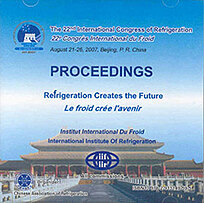
Summary
The temperature difference between condensation and evaporation is about 40-50°C normally in single-stage compression heat pump, which will be larger in zeotropic refrigerant mixture auto-cascade cycle. The heating temperature difference and the applicability of single-stage heat pump would be enlarged if the zeotropic refrigerant mixture auto-cascade cycle was applied to heat pump. In this paper, an auto-cascade air source heat pump water heater was built. Using the NIST REFPROP 7.0, the temperature concentration diagram of a typical binary zeotropic refrigerant mixture was drawn. With a series of experiments, the whole circulation process of auto-cascade heat pump water heater and influencing factors of COP under higher water temperature were analysed. The results show that the internal heat exchanger between evaporative condenser and evaporator should be cancelled for better heat transfer in auto-cascade heat pump. The mass flow of cold flow can be reduced as the opening degree of the electron expansion valve J1 reduces, so the degree of superheat of compressor suction can be reduced and the heating effect of heat pump increases. Lower COP of auto-cascade heat pump is a disadvantage, and the way to improve it should be sought in the future.
Available documents
Format PDF
Pages: ICR07-E2-1266
Available
Public price
20 €
Member price*
Free
* Best rate depending on membership category (see the detailed benefits of individual and corporate memberships).
Details
- Original title: Experiment on the performance of an auto-cascade heat pump system using zeotrope refrigerant mixtures.
- Record ID : 2008-0863
- Languages: English
- Source: ICR 2007. Refrigeration Creates the Future. Proceedings of the 22nd IIR International Congress of Refrigeration.
- Publication date: 2007/08/21
Links
See other articles from the proceedings (839)
See the conference proceedings
Indexing
-
Themes:
Heat pumps techniques;
CO2;
Blends - Keywords: Air-water; Heat pump; Performance; Cascade system; Zeotropic mixture; Expérimentation; Refrigerant; CO2
-
Thermodynamic performance assessment of carbon ...
- Author(s) : DAI B., LI M., DANG C., et al.
- Date : 2014/08/02
- Languages : English
- Source: 11th IIR Gustav Lorentzen Conference on Natural Refrigerants (GL2014). Proceedings. Hangzhou, China, August 31-September 2, 2014.
- Formats : PDF
View record
-
Analysis of heat pump cycle using CO2/DME mixtu...
- Author(s) : ONAKA Y., MIYARA A., TSUBAKI K., et al.
- Date : 2008/07/14
- Languages : English
- Source: 2008 Purdue Conferences. 19th International Compressor Engineering Conference at Purdue & 12th International Refrigeration and Air-Conditioning Conference at Purdue [CD-ROM].
- Formats : PDF
View record
-
Characteristics of R134a/R410A cascade heat pum...
- Author(s) : KIM D. H., PARK H. S., KIM M. S.
- Date : 2012/07/16
- Languages : English
- Source: 2012 Purdue Conferences. 14th International Refrigeration and Air-Conditioning Conference at Purdue.
- Formats : PDF
View record
-
Experimental assessment on performance of a hea...
- Author(s) : FUKUDA S., KOJIMA H., KONDOU C., et al.
- Date : 2016/07/11
- Languages : English
- Source: 2016 Purdue Conferences. 16th International Refrigeration and Air-Conditioning Conference at Purdue.
- Formats : PDF
View record
-
Modelling and optimization of cascade high-temp...
- Author(s) : GANESAN P., EIKEVIK T. M.
- Date : 2023/08/21
- Languages : English
- Source: Proceedings of the 26th IIR International Congress of Refrigeration: Paris , France, August 21-25, 2023.
- Formats : PDF
View record
